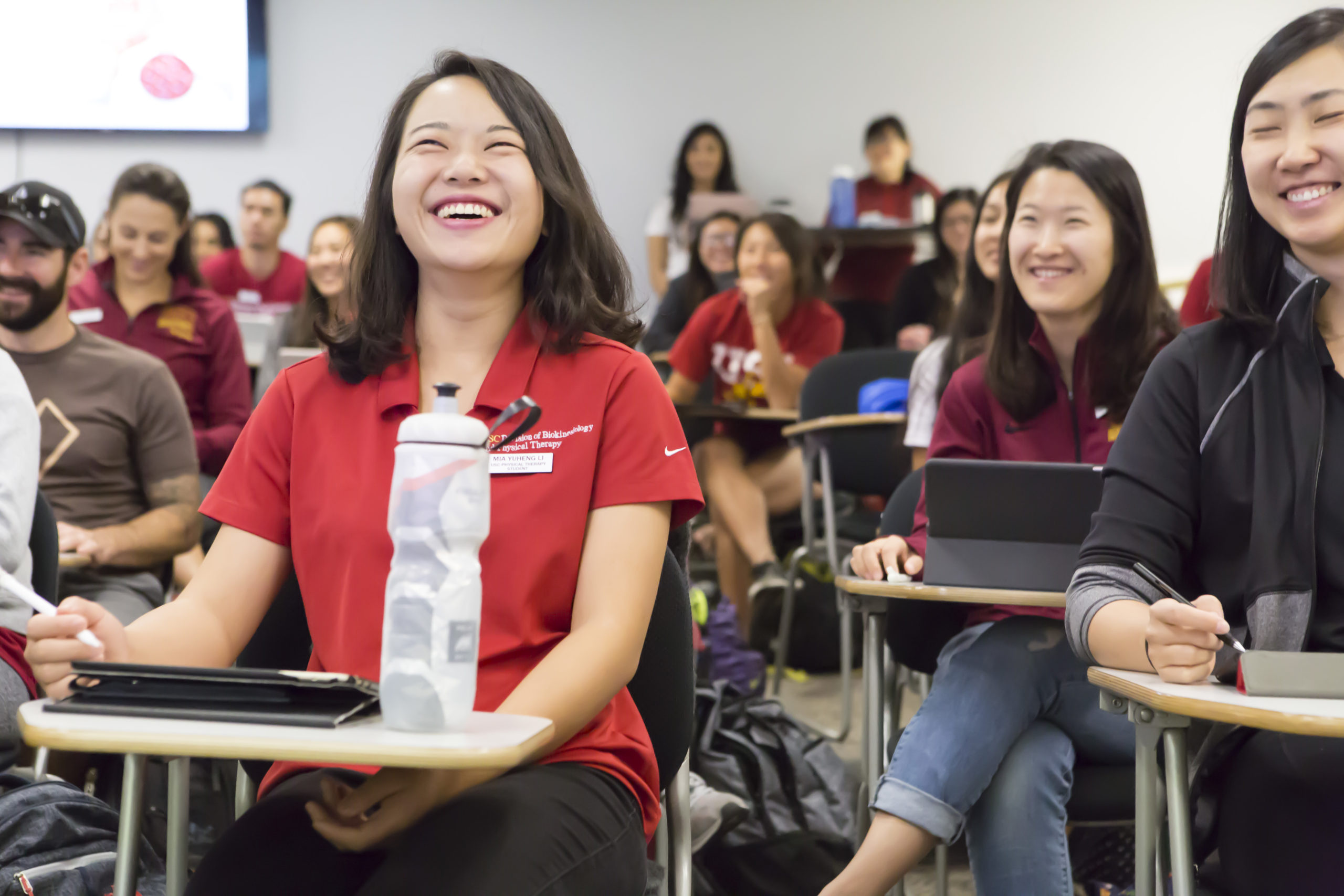
EDUCATION SCHOLARSHIP AND RESEARCH
Our researchers aim to advance the USC Division of Biokinesiology and Physical Therapy’s vision for transforming physical therapy education. We study and disseminate best practices in teaching and learning from classroom to clinical settings.
Knowledge about best practices in teaching and learning within physical therapy education can be applied to maximize student engagement, faculty effectiveness, and ultimately quality of patient care. Among the areas we study:
- Innovative curricular models, including hybrid delivery and flipped classroom
- Inclusive learning design and health/social justice
- Educational technology
- Student engagement and learning outcomes
- Faculty development best practices
We seek to engage and collaborate with a national network of colleagues interested in advancing physical therapy education.
Learn More
Mike Andersen, PT, DPT
Psychomotor learning
Delivery models
Mentoring of DPT students
Kate Havens, PhD
Anatomy education
Dan Kirages, PT, DPT
Integration of scope of practice into curricular design (pelvic health)
Danielle Long, PT, DPT
Assessment
Student motivation in learning
Didi Matthews, PT, DPT
Curricular assessment and thread development
Faculty development
Monica Nelsen, PT, DPT
Curricular integration
Jessica Rancour, PT, DPT
Clinical education
DPT student mentoring
Eric Robertson, PT, DPT
Clinical reasoning assessment
Delivery models
Layered learning
Elise Ruckert, PT, DPT
Instructional design/Course design
Mindset and student engagement in learning
Valerie Teglia, PT, DPT
Clinical education
Development of affective skills and professionalism
Julie Tilson, PT, DPT, MS
Evidence integration and assimilation
Physical therapy education learning outcomes
Kimiko Yamada, PT, DPT
Equitable and inclusive teaching
Faculty development
Noriko Yamaguchi, PT, DPT
Health, social and environmental justice in PT education
Equity framework in PT education
Educational Scholarship across lines of inquiry:
Innovative curricular models, including hybrid delivery and flipped classroom
- Martinez C, Tilson JK. Controlled comparison of a flipped classroom evidence-based practice course delivered online or on-campus [published online ahead of print, 2021 Jan 5]. BMJ Evid Based Med. 2021;bmjebm-2020-111522.
- Blackington, M, Fritz S, Gagnon, K, Landers, M, Matthews, ND, Santasier, A, Varnado K. Talk to the Experts: Best Practice for Overcoming Challenges in Online & Blended Learning Environments. ACAPT Webinar, September 10, 2020.
- Tilson, J, Andersen, M, Havens, K, Krause, L, Matthews, ND, Yamaguchi, N. Transitioning to a Hybrid Format: Lessons Learned for Developing Physical Skills, ACAPT Webinar, July 24, 2020.
- Martinez, C, Tilson, JK. Teaching EBP in a flipped classroom model: a controlled comparison between learning on-campus and online. 8th International Conference of the International Society of EBHC with 9th International Conference for EBHC Teachers and Developers. Taormina, Italy. November 8, 2019.
- Andersen M, Sebelski CA, Martinez C, Kirages DJ, Vagy J, Tilson JK. Hybrid and Traditional Instruction: A Controlled Comparison of Student Performance in a Clinical Skills Course. October 18, 2020. Online Conference.
- Andersen M, Havens K, Kirages DJ, Nelsen M, Robertson E, Tilson JK, Sebelski CA. DPT Student Self-Efficacy on Psychomotor Skill Performance: A Comparison of Hybrid and Traditional Learning Models. Educational Leadership Conference. October 20, 2019. Seattle, WA.
- Tilson JK, Landel R, Andersen M, Dominguez J, Kirages D, Robertson R, Sebelski C, Simpson S, Stevenson J, Teglia V, Aguilar S, Gordon J. Expanding a DPT program to include a hybrid online/on-campus cohort: a case study of shared governance. October 14, 2018. Educational Leadership Conference. Jacksonville, FL.
- Tilson JK, Gordon J, Andersen M, Dominguez J, Havens K, Hershberg J, Kirages D, Landel R, Robertson E, Simpson M, Stevenson J. Implementing a Hybrid Online/On-Campus DPT Program at a Research-Intensive Institution: A Protocol for Comparing Learning Outcomes with an Existing Residential Program. APTA Combined Sections Meeting. February 24, 2018. New Orleans, LA. (poster)
- McDonald P, Ruckert E, Barnett J, Straker H, Ekmecki O. Technological Innovation in Online Classrooms: Meeting the Needs of the 21st Century Workforce in Health Professions Education. Bing H (Ed). In: Volume III: Contemporary Perspectives on Technological Innovation, Management, and Policy. IAP Information Age Publishing, Inc, 2017.
- Catalino, Tricia, Gagnon, Kendra, Johnson, Kristen, Andersen, Michael A, Koszalinski, Alex, Simpson, Michael; Student Success in an Online World: Resiliency During a Pandemic; Live Synchronous Educational Session, Educational Leadership Conference, APTA, October 18, 2020
- Andersen, Michael A, Vagy, Jared, Kirages, Dan, Nelsen, Monica, Martinez, Clarisa, Sebelski, Chris, Tilson, Julie K; Translation of a Traditional DPT Clinical Course into a Hybrid Online/On-Campus Model, Poster Presentation, California Physical Therapy Association Annual Conference, October 3-4, 2020
- Yamaguchi N, Yamada KA, Sweeney R. Universal Design for Learning: Bringing Equity and Inclusion into Physical Therapy Education. Education Leadership Conference. Atlanta, GA. October 23, 2021.
- Yamaguchi N, Yamada KA, Yamaguchi R. Applying an equity framework to physical therapy education: A case for culturally responsive teaching. Poster presentation. APTA Combined Sections Meeting. San Antonio, TX. February 5, 2022.
Faculty development best practices
- Bilyeu, C, Matthews, ND, Niski J, Reilly M. Creating Associated Faculty Development Opportunities: Enhancing Habits of the Head and Heart. Education Leadership Conference, Atlanta, GA, October 24, 2021

